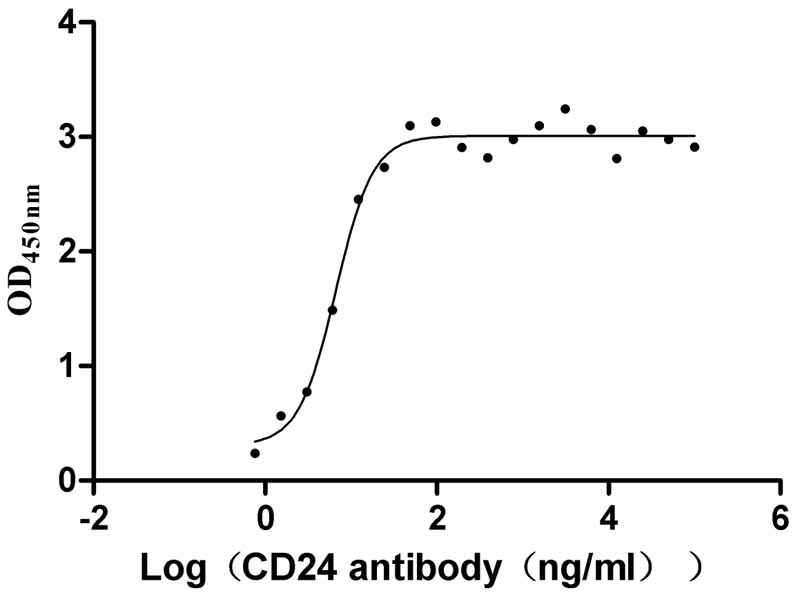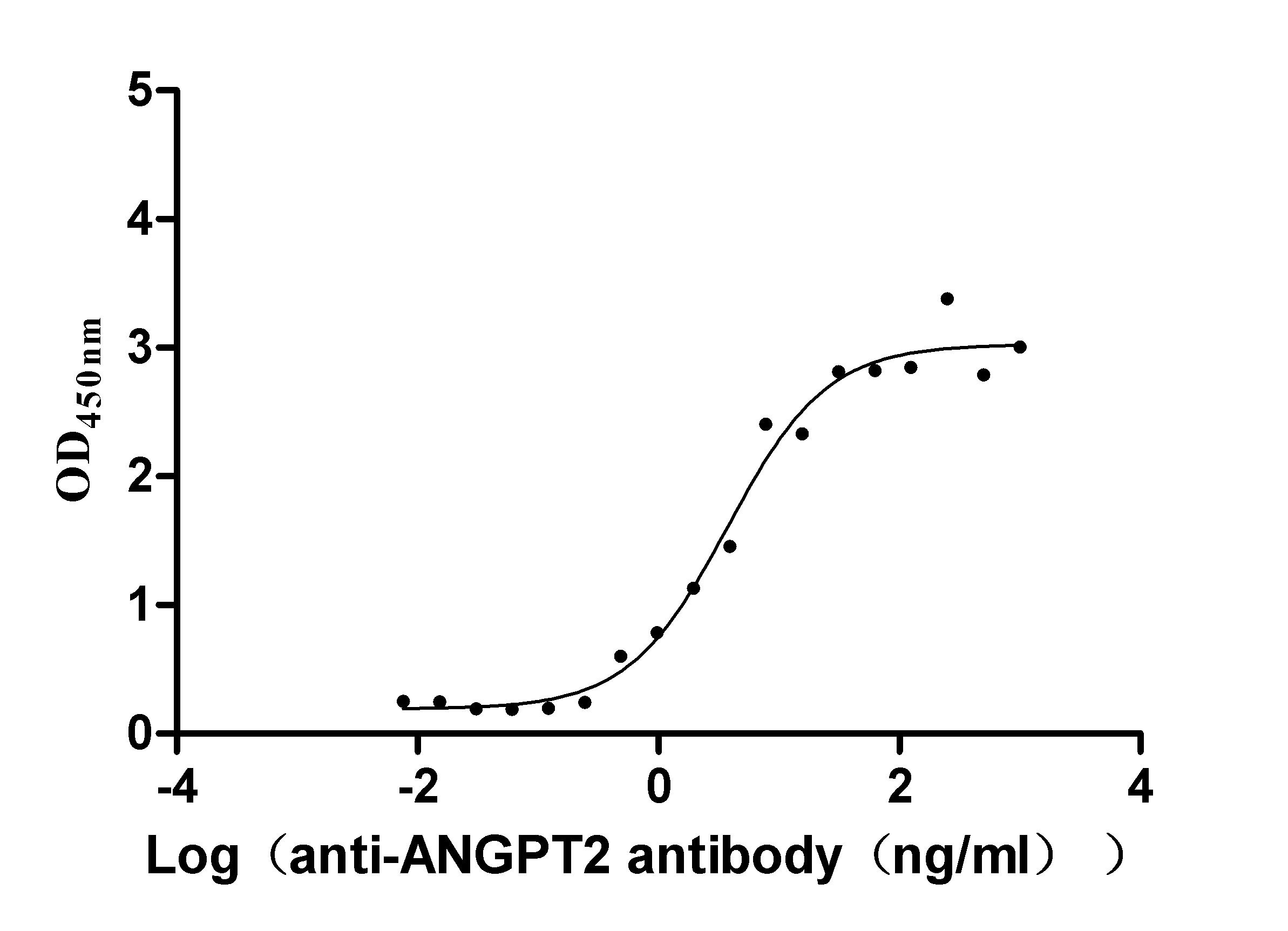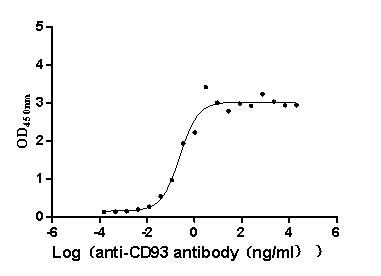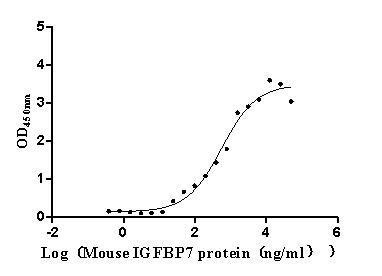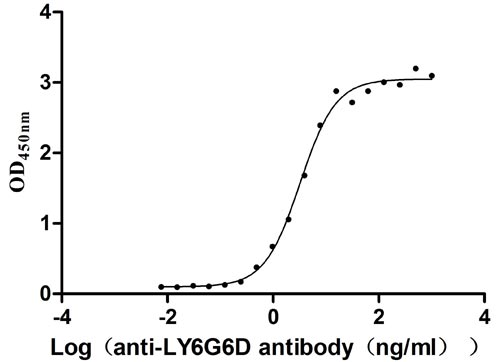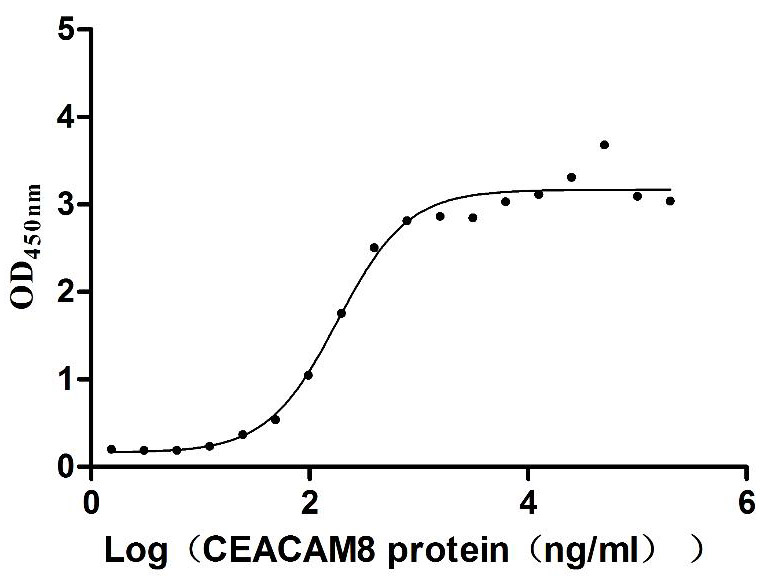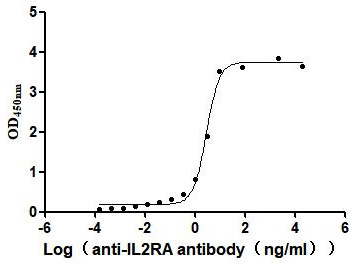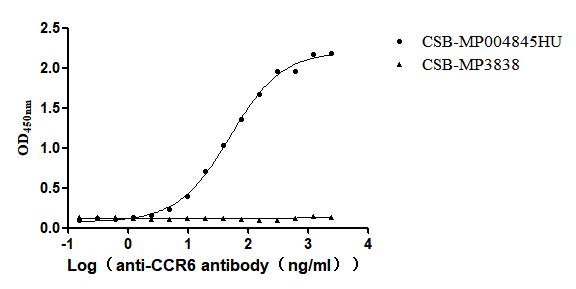Recombinant Mouse Protein quaking (Qki)
-
中文名称:小鼠Qki重组蛋白
-
货号:CSB-YP874131MO
-
规格:
-
来源:Yeast
-
其他:
-
中文名称:小鼠Qki重组蛋白
-
货号:CSB-EP874131MO
-
规格:
-
来源:E.coli
-
其他:
-
中文名称:小鼠Qki重组蛋白
-
货号:CSB-EP874131MO-B
-
规格:
-
来源:E.coli
-
共轭:Avi-tag Biotinylated
E. coli biotin ligase (BirA) is highly specific in covalently attaching biotin to the 15 amino acid AviTag peptide. This recombinant protein was biotinylated in vivo by AviTag-BirA technology, which method is BriA catalyzes amide linkage between the biotin and the specific lysine of the AviTag.
-
其他:
-
中文名称:小鼠Qki重组蛋白
-
货号:CSB-BP874131MO
-
规格:
-
来源:Baculovirus
-
其他:
-
中文名称:小鼠Qki重组蛋白
-
货号:CSB-MP874131MO
-
规格:
-
来源:Mammalian cell
-
其他:
产品详情
-
纯度:>85% (SDS-PAGE)
-
基因名:Qki
-
Uniprot No.:
-
别名:Qki; Qk; Qk1; Qka1; Protein quaking; MqkI; qkI
-
种属:Mus musculus (Mouse)
-
蛋白长度:full length protein
-
表达区域:1-341
-
氨基酸序列MVGEMETKEK PKPTPDYLMQ LMNDKKLMSS LPNFCGIFNH LERLLDEEIS RVRKDMYNDT LNGSTEKRSA ELPDAVGPIV QLQEKLYVPV KEYPDFNFVG RILGPRGLTA KQLEAETGCK IMVRGKGSMR DKKKEEQNRG KPNWEHLNED LHVLITVEDA QNRAEIKLKR AVEEVKKLLV PAAEGEDSLK KMQLMELAIL NGTYRDANIK SPALAFSLAA TAQAAPRIIT GPAPVLPPAA LRTPTPAGPT IMPLIRQIQT AVMPNGTPHP TAAIVPPGPE AGLIYTPYEY PYTLAPATSI LEYPIEPSGV LGAVATKVRR HDMRVHPYQR IVTADRAATG N
-
蛋白标签:Tag type will be determined during the manufacturing process.
The tag type will be determined during production process. If you have specified tag type, please tell us and we will develop the specified tag preferentially. -
产品提供形式:Lyophilized powder
Note: We will preferentially ship the format that we have in stock, however, if you have any special requirement for the format, please remark your requirement when placing the order, we will prepare according to your demand. -
复溶:We recommend that this vial be briefly centrifuged prior to opening to bring the contents to the bottom. Please reconstitute protein in deionized sterile water to a concentration of 0.1-1.0 mg/mL.We recommend to add 5-50% of glycerol (final concentration) and aliquot for long-term storage at -20℃/-80℃. Our default final concentration of glycerol is 50%. Customers could use it as reference.
-
储存条件:Store at -20°C/-80°C upon receipt, aliquoting is necessary for mutiple use. Avoid repeated freeze-thaw cycles.
-
保质期:The shelf life is related to many factors, storage state, buffer ingredients, storage temperature and the stability of the protein itself.
Generally, the shelf life of liquid form is 6 months at -20°C/-80°C. The shelf life of lyophilized form is 12 months at -20°C/-80°C. -
货期:Delivery time may differ from different purchasing way or location, please kindly consult your local distributors for specific delivery time.Note: All of our proteins are default shipped with normal blue ice packs, if you request to ship with dry ice, please communicate with us in advance and extra fees will be charged.
-
注意事项:Repeated freezing and thawing is not recommended. Store working aliquots at 4°C for up to one week.
-
Datasheet :Please contact us to get it.
靶点详情
-
功能:RNA-binding protein that plays a central role in myelinization. Also required for visceral endoderm function and blood vessel development. Binds to the 5'-NACUAAY-N(1,20)-UAAY-3' RNA core sequence. Acts by regulating pre-mRNA splicing, mRNA export, mRNA stability and protein translation, as well as cellular processes including apoptosis, cell cycle, glial cell fate and development. Required to protect and promote stability of mRNAs such as MBP and CDKN1B which promotes oligodendrocyte differentiation. Participates in mRNA transport by regulating the nuclear export of MBP mRNA. May also play a role in smooth muscle development.; Isoform 1 is involved in regulation of mRNA splicing of MAG pre-mRNA by acting as a negative regulator of MAG exon 12 alternative splicing.; Isoform 3 can induce apoptosis, while heterodimerization with other isoforms results in nuclear translocation of isoform 3 and suppression of apoptosis.; Isoform 4 acts as a translational repressor for GLI1.
-
基因功能参考文献:
- These data collectively indicate that Qki5 regulates communication between neural stem cells by mediating numerous RNA processing events and suggest new links between splicing regulation and neural stem cell states. PMID: 29021239
- this study explores how levels of two isoforms, nuclear Quaking-5 (Qk5) and cytoplasmic Qk6, are regulated in mouse myoblasts. Qk5 and Qk6 proteins have distinct functions in splicing and translation, respectively, enforced through differential subcellular localization. PMID: 29021242
- QKI is involved in multiple aspects of oligodendroglial development. QKI disruption can impact the cell fate of oligodendrocyte precursor cells, their migration and differentiation, and ultimately myelination in the cerebellum. PMID: 26645409
- Data indicate a central role of microRNA miR-214 in embryonic stem cells (ESCs) - vascular smooth muscle cells (VSMCs) differentiation, and identified quaking (QKI) as a functional modulating target in miR-214 mediated VSMCs differentiation. PMID: 28186995
- QKI was strongly expressed by Muller glial cells in both the developing and adult retina. Neuronal expression was uniformly weak in the adult. QKI-5 was the predominantly expressed isoform in the adult retina. PMID: 27196066
- QKI directly plays a crucial role in the post-transcriptional regulation and expression of Sirt2 to facilitate oligodendrocyte differentiation. PMID: 28188285
- findings reveal a crucial role for the miR-214-Qki pathway in the regulation of neuronal dendritic development. PMID: 27129236
- we identify QKI as the long-sought regulator of Neurofascin alternative splicing PMID: 27053216
- Data implicate QKI in the pathophysiology of inflammation and leukemoogenesis where miR-155 is involved. PMID: 26337206
- Study establish that the shk mutation, previously localized to chromosome 17, is a quaking (qk) allele consisting of a 105-nucleotide insertion in the qk regulatory region that decreases qk transcription PMID: 25185516
- These results suggested that QKI5 deficiency contributed to the overactivation of FoxO1 in ob/ob animals and subsequently magnified nitrosative stress and endoplasmic reticulum stress. PMID: 25068621
- The study provides evidence that cytoplasmic quaking I-6 acts upstream of hnRNP F/H, which forms a novel pathway to control alternative splicing in myelinating glia. PMID: 24792162
- Propose that QKI is a central regulator of VSMC phenotypic plasticity and that intervention in QKI activity can ameliorate pathogenic, fibroproliferative responses to vascular injury. PMID: 23963726
- MicroRNA-214 inhibits angiogenesis by targeting Quaking and reducing angiogenic growth factor release. PMID: 22227154
- establish that p53 directly regulates Quaking (QKI) gene expression, and QKI protein associates with and leads to the stabilization of miR-20a PMID: 22751500
- The QKI RNA-binding proteins regulate oligodendrocyte differentiation by modulating the expression of AIP-1. PMID: 20631256
- Quaking protein binds MBP RNA and ensures the proper sub-cellular localization and expression of myelin. PMID: 20573244
- findings suggest that QKI participates in myelination by regulating the mRNA export of key protein components PMID: 12467586
- The quakingviable mutation affects qkI mRNA expression specifically in myelin-producing cells of the nervous system. PMID: 12888522
- QKI protein has a critical regulatory role in smooth muscle cell development, and that smooth muscle cells play an important role in inducing vascular remodeling PMID: 14706070
- may play a role for myelin basic protein mRNA homeostasis PMID: 15528192
- The mRNA encoding cyclin-dependent kinase (CDK)-inhibitor p27(Kip1) was bound and stabilized by QKI, leading to increased accumulation of p27(Kip1) protein in oligodendrocytes. QKI is upstream of p27(Kip1) during oligodendrocyte differentiation. PMID: 15568022
- A new viable ENU-induced allele of the mouse quaking gene causes severe CNS dysmyelination. PMID: 16245024
- Regulates visceral endoderm function, which is critical for vascular remodeling. PMID: 16470614
- QKI-dependent stabilization of MAP1B mRNA provides a novel mechanism for advancing MAP1B expression specifically in oligodendroglia during brain development. PMID: 16855020
- we discuss the recent advances in characterizing the QKI KH-type proteins as glial cell fate and myelin egulators. PMID: 17132940
- There are many isoforms of this RNA binding protein. QKI-5 regulates alternate splicing of the MAG (myelin associated glycoprotein) message and probably other myelin genes PMID: 11917126
- Quaking is essential for blood vessel development during embryonic development. PMID: 11892011
显示更多
收起更多
-
相关疾病:Defects in Qki are the cause of quakingviable (qkv). Qkv is a spontaneous mutation resulting in hypomyelinization of the central and peripheral nervous systems. Mutant mice develop normally until postnatal day 10 when they display rapid tremors or 'quaking' that is especially pronounced in hindlimbs and experience convulsive tonic-clonic seizures as they mature (PubMed:8589716). Mice with qkv specifically lack isoform 3 and isoform 4 in myelin-forming cells, while isoform 1 is lacking in oligodendrocytes of severely affected tracts (PubMed:12888522). Mice with qkv also lack the PRKN gene product, suggesting that the absence of PRKN may also affect the phenotype (PubMed:15014970).
-
亚细胞定位:Cytoplasm. Nucleus.; [Isoform 1]: Cytoplasm. Nucleus. Note=Isoform 1 localizes predominantly in the nucleus and at lower levels in cytoplasm. It shuttles between the cytoplasm and the nucleus.; [Isoform 3]: Cytoplasm. Nucleus. Note=Isoform 3 localizes predominantly in the cytoplasm and at much lower levels in nucleus.; [Isoform 4]: Cytoplasm. Nucleus. Note=Isoform 4 localizes both in the cytoplasm and nucleus.
-
组织特异性:Highly expressed in myelin-forming cells. Expressed in oligodendrocytes and astrocytes in the central nervous system as well as Schwann cells in the peripheral nervous system. Also expressed in the yolk sac endoderm, adjacent to the mesodermal site of dev
-
数据库链接:
KEGG: mmu:19317
STRING: 10090.ENSMUSP00000095025
UniGene: Mm.130694
Most popular with customers
-
Recombinant Human Signal transducer CD24 (CD24)-Nanoparticle (Active)
Express system: Mammalian cell
Species: Homo sapiens (Human)
-
Recombinant Dog Angiopoietin-2 (ANGPT2) (Active)
Express system: Mammalian cell
Species: Canis lupus familiaris (Dog) (Canis familiaris)
-
Recombinant Macaca fascicularis CD93 molecule (CD93), partial (Active)
Express system: Mammalian cell
Species: Macaca fascicularis (Crab-eating macaque) (Cynomolgus monkey)
-
Recombinant Mouse Complement component C1q receptor (Cd93), partial (Active)
Express system: Mammalian cell
Species: Mus musculus (Mouse)
-
Recombinant Human Lymphocyte antigen 6 complex locus protein G6d (LY6G6D) (Active)
Express system: Yeast
Species: Homo sapiens (Human)
-
Recombinant Human Carcinoembryonic antigen-related cell adhesion molecule 6 (CEACAM6) (Active)
Express system: Mammalian cell
Species: Homo sapiens (Human)
-
Recombinant Human Interleukin-2 receptor subunit alpha (IL2RA), partial (Active)
Express system: Mammalian cell
Species: Homo sapiens (Human)
-
Recombinant Human C-C chemokine receptor type 6(CCR6)-VLPs (Active)
Express system: Mammalian cell
Species: Homo sapiens (Human)


